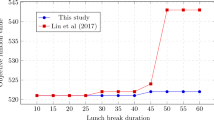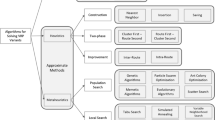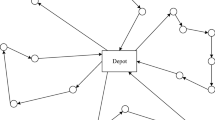Abstract
In this research, we study permutation flowshop scheduling problem with minimal and maximal time lags while minimizing the total tardiness. The time lags are defined between couples of successive operations of jobs. Each time lag is greater than or equal to a prescribed value called minimal time lag and smaller than or equal to a prescribed value called maximal time lag. A new mathematical formulation is proposed. Upper bounds are provided by applying heuristic procedures based on known and new rules. Then, new lower bounds are derived by applying different methods where the main one is the Lagrangian relaxation. In order to make the last technique a viable approach to the considered problem, an auxiliary formulation is adopted and the Lagrangian multipliers are updated using the subgradient algorithm. Then, results of computational experiments are reported.
Similar content being viewed by others
References
Baker KR (1974) Introduction to sequencing and scheduling. Wiley, New York
Bulbul K, Kaminsky P, Yano C (2004) Flow shop scheduling with earliness, tardiness, and intermediate inventory holding costs. Nav Res Logist 51:407–445
Chu C, Proth JM (1996) Single machine scheduling with chain structured precedence constraints and separation time windows. IEEE Trans Robot Autom 12:835–844
Czerwinski CS, Luh PB (1994) Scheduling products with bills of materials using an improved Lagrangian relaxation technique. IEEE Trans Robot Autom 10:99–111
Dell’Amico M (1996) Shop problems with two machines and time lags. J Oper Res 44:777–787
Fondrevelle J, Oulamara A, Portmann MC (2006) Permutation flowshop scheduling problems with maximal and minimal time lags. Comput Oper Res 33:1540–1556
Foulds LR, Wilson JM (2005) Scheduling operations for the harvesting of renewable resources. J Food Eng 70:281–292
Ghassemi TF, Olfat LA (2010) A set of algorithms for solving the generalized tardiness flowshop problems. J Ind Syst Eng 4:156–166
Graham R, Lawler E, Lenstra JK, Rinnooy Kan AHG (1979) Optimization and approximation in deterministic sequencing and scheduling: a survey. Ann Discret Math 5:287–326
Koulamas C (1994) The total tardiness problem: review and extensions. Oper Res 42:1025–1041
Liu G, Luh PB, Resch R (1997) Scheduling permutation flowshops using the lagrangian relaxation technique. Ann Oper Res 70:171–189
Luh PB, Hoitomt DJ (1993) Scheduling of manufacturing systems using the Lagrangian relaxation technique. IEEE Xplore 38:1066–1080
Nishi T, Isoya Y, Inuiguchi M (2009) An integrated column generation and lagrangian relaxation for flowshop scheduling problems: systems, man and cybernetics. SMC. IEEE international conference. pp 11–14
Nishi T, Hiranakaa Y, Inuiguchi M (2010) Lagrangian relaxation with cut generation for hybrid flowshop scheduling problems to minimize the total weighted tardiness. Comput Oper Res 37:189–198
Nishi T, Hiranakaa Y (2013) Lagrangian relaxation and cut generation for sequence-dependent setup time flowshop scheduling problems to minimise the total weighted tardiness. Int J Product Res 51:4778–4796
Pinedo M (1995) Scheduling theory, algorithms, and systems. Prentice Hall, Upper Saddle River, New Jersey
Yu W, Hoogeveen H, Lenstra JK (2004) Minimising makespan in a two machine flowshop with delays and unit time operations is NP-hard. J Sched 7:333–348
Author information
Authors and Affiliations
Corresponding author
Rights and permissions
About this article
Cite this article
Hamdi, I., Loukil, T. Minimizing total tardiness in the permutation flowshop scheduling problem with minimal and maximal time lags. Oper Res Int J 15, 95–114 (2015). https://doi.org/10.1007/s12351-014-0166-5
Received:
Revised:
Accepted:
Published:
Issue Date:
DOI: https://doi.org/10.1007/s12351-014-0166-5




